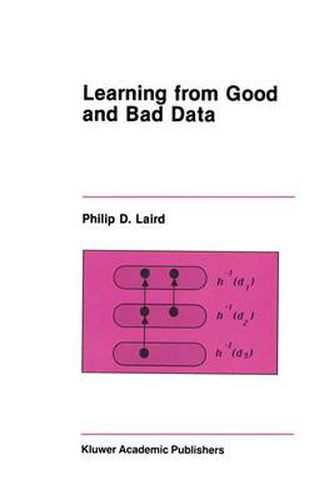Readings Newsletter
Become a Readings Member to make your shopping experience even easier.
Sign in or sign up for free!
You’re not far away from qualifying for FREE standard shipping within Australia
You’ve qualified for FREE standard shipping within Australia
The cart is loading…






This title is printed to order. This book may have been self-published. If so, we cannot guarantee the quality of the content. In the main most books will have gone through the editing process however some may not. We therefore suggest that you be aware of this before ordering this book. If in doubt check either the author or publisher’s details as we are unable to accept any returns unless they are faulty. Please contact us if you have any questions.
This monograph is a contribution to the study of the identification problem: the problem of identifying an item from a known class us ing positive and negative examples. This problem is considered to be an important component of the process of inductive learning, and as such has been studied extensively. In the overview we shall explain the objectives of this work and its place in the overall fabric of learning research. Context. Learning occurs in many forms; the only form we are treat ing here is inductive learning, roughly characterized as the process of forming general concepts from specific examples. Computer Science has found three basic approaches to this problem: * Select a specific learning task, possibly part of a larger task, and construct a computer program to solve that task . * Study cognitive models of learning in humans and extrapolate from them general principles to explain learning behavior. Then construct machine programs to test and illustrate these models. xi Xll PREFACE * Formulate a mathematical theory to capture key features of the induction process. This work belongs to the third category. The various studies of learning utilize training examples (data) in different ways. The three principal ones are: * Similarity-based (or empirical) learning, in which a collection of examples is used to select an explanation from a class of possible rules.
$9.00 standard shipping within Australia
FREE standard shipping within Australia for orders over $100.00
Express & International shipping calculated at checkout
This title is printed to order. This book may have been self-published. If so, we cannot guarantee the quality of the content. In the main most books will have gone through the editing process however some may not. We therefore suggest that you be aware of this before ordering this book. If in doubt check either the author or publisher’s details as we are unable to accept any returns unless they are faulty. Please contact us if you have any questions.
This monograph is a contribution to the study of the identification problem: the problem of identifying an item from a known class us ing positive and negative examples. This problem is considered to be an important component of the process of inductive learning, and as such has been studied extensively. In the overview we shall explain the objectives of this work and its place in the overall fabric of learning research. Context. Learning occurs in many forms; the only form we are treat ing here is inductive learning, roughly characterized as the process of forming general concepts from specific examples. Computer Science has found three basic approaches to this problem: * Select a specific learning task, possibly part of a larger task, and construct a computer program to solve that task . * Study cognitive models of learning in humans and extrapolate from them general principles to explain learning behavior. Then construct machine programs to test and illustrate these models. xi Xll PREFACE * Formulate a mathematical theory to capture key features of the induction process. This work belongs to the third category. The various studies of learning utilize training examples (data) in different ways. The three principal ones are: * Similarity-based (or empirical) learning, in which a collection of examples is used to select an explanation from a class of possible rules.